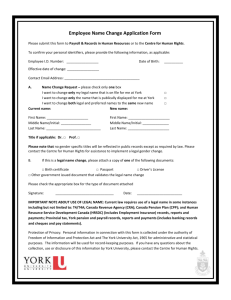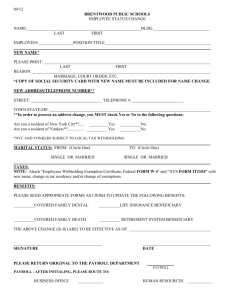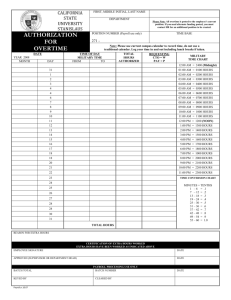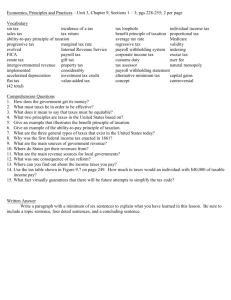Business Plan
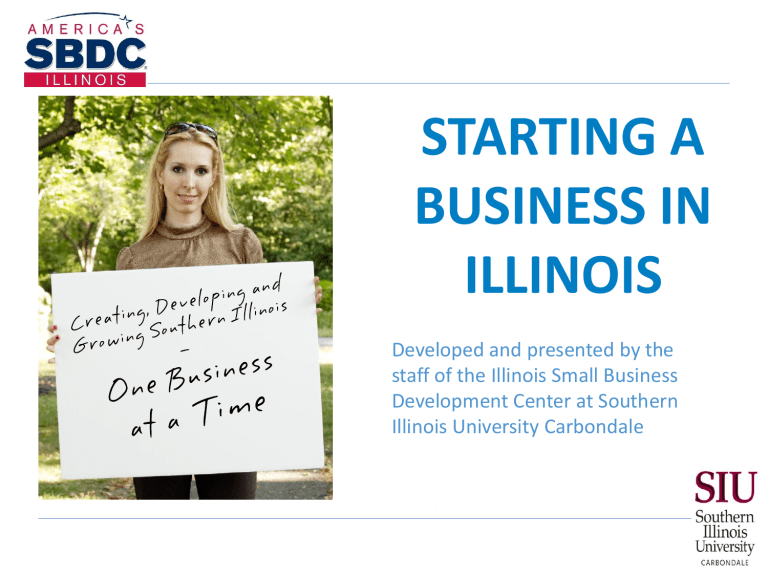
STARTING A
BUSINESS IN
ILLINOIS
Developed and presented by the staff of the Illinois Small Business
Development Center at Southern
Illinois University Carbondale
Welcome
• The SBDC at Southern
Illinois University was established to help entrepreneurs start a new business or expand an existing business
• Confidential counseling for all business activities
Our Services
• General business advice
• Business plan development
• Financial analysis
• Marketing assistance
• Prototype development
• Loan packaging
• Market research
• Exporting/international trade
• Seminars/custom training
• Technology commercialization
Centers That Can Help You
Incubator Space
• Flexible Space
• Internet & Telecom
• Shared Services
• Conference Space
Incubator Space
• Laboratories
• Affiliate Office Space
• Student Incubator (Saluki Ventures)
• Light Manufacturing
• Office Space
• Ranging in Size from 150 to 1050 ft 2
Is starting a business right for you?
• Why are you doing this?
• Do you have the money to start a business?
• Are you willing & motivated to work long hours?
• Do you have the support structure
(family/friends) who will encourage you?
Starting a business is hard!
Over half will fail.
Challenges to Success
• Not enough money to cover business expenses
• Poor business management/unclear direction
• Miscalculation of market potential
• Ineffective advertising
• Poor credit
• Poor location
• Not considering legal aspects
• Choosing the wrong partners
Failing to Plan Is Planning to Fail – Benjamin Franklin
What type of business do you want?
• Startup
– YOUR Dream
• Purchase an existing business
– You will take on current clients and the business’s reputation
• Franchise
– You will have less control, but the model is proven
Today’s Topics
Structures
Registrations
Taxes
Record- keeping
Banking
Insurance
Employees
Payroll
Business Plan
Financing
Choosing a Legal Structure
Ability to get financing
Liability concerns
Sole Proprietorship
Partnership
Corporation
LLC
Startup costs
& licensing
Tax requirements
Sole Proprietorship
• Individual
• No legal entity
• Owner responsible for all debts & contracts
• Profit/loss is on personal taxes
• Easy to establish
• Control
• No entity tax (Schedule C)
• Own P&L
• Unlimited liability
• Limited access to capital
• Limited life
Partnership
• Agreement between 2+ people (written)
• No legal entity
• Each partners responsible for all debts & contracts
• Partners are proportionally responsible for profit /loss on personal taxes
• May be easier to set up
• Not alone
• Unlimited, equal liability
• Shared Control
• Limited transferability
Corporation
• Created by filing articles of incorporation
• Separate entity from individual owner(s).
• Owners (shareholders) have limited liability protection.
• Owners personally guarantee loans
• C-Corp vs. S-Corp
• Separate legal entity
• Limited liability
• Unlimited life
• Raise capital
• Case history
• Increased administration
• Costs more than
Partnership / SP to administer
Limited Liability Company (LLC)
• Created by filing articles of organization
• LLCs combine liability protection and flexible tax status.
• Members guarantee loans
• Members disclose profits/losses on personal taxes
• Same as corporation
• Easier to administer
• Flexible tax structure
• Increased start up fees
• Lack of case history
• Different state laws
Today’s Topics
Structures
Registrations
Taxes
Record-keeping
Banking
Insurance
Employees
Payroll
Business Plan
Financing
Choosing a Name
• Unique, memorable, easy to say/ spell
• Relevant to you/ your business
• Distinguishable
• Check URL availability/ domain registration
• Google it
Assumed Name Registration
• Assumed name notice for sole proprietorships
& partnerships
• Only documents who is using the name
• No protection from others using it
• Protection comes from trademark
Licenses and Permits
• City
• County
• State
• Industry-specific permits
– Health Department (restaurants)
– Children
• Check the SBA Website for a listing
– http://www.sba.gov/licenses-and-permits
Federal Employer Identification Number (FEIN)
• The Social Security Number for your business
• Required for:
– Partnerships
– Corporations / LLCs
– Any business that pays wages
• If a FEIN is not required, use your SSN
When ownership of a business changes or if you purchase a business, you may be required to get a new FEIN.
Today’s Topics
Structures
Registrations
Taxes
Record-keeping
Banking
Insurance
Employees
Payroll
Business Plan
Financing
Self-Employment Tax
• The first $117,000 of income is subject to a
12.4% FICA (Social Security tax)
• Medicare Tax rate of 2.9%
• Required for sole proprietors or partnerships when you earn more than $400
• Payable quarterly
Self-employment tax is 15.3%
Illinois Business Tax Number required if:
Do you…
Purchase wholesale items for resale?
Pay Sales Tax
Pay Employees
Yes
OR…
Is your business a… YES
Partnership
Corporation/LLC
Sales Tax – Remitted to the IL Dept. of Revenue
• Collected when selling a retail product
• Tax rates are based on location
• Tax not collected on labor, but it is on parts
• Personal usage-tax in lieu of Sales tax
• Pay online
• Online taxes must be accounted for when selling to a resident of IL
• www.iltax.com
Today’s Topics
Structures
Registrations
Taxes
Record-keeping
Banking
Insurance
Employees
Payroll
Business Plan
Financing
Record Keeping
• Records are required to prove income, deductions, and profits/ losses for each year
• Software is a great tool to track finances
• Use a good filing system to track business related expenses for deductions
• Keep good and accurate records
– Document management decisions
– Tax Time
When you apply for a loan or sell your business, “book value” should support what you are asking for.
What should I keep?
• Keep daily transaction records for seven years
– Cancelled checks, invoices, purchase orders, sales receipts
• Keep payroll records and original tax returns forever
Always be prepared for an audit
Make backups & have safe storage
Today’s Topics
Structures
Registrations
Taxes
Record-keeping
Banking
Insurance
Employees
Payroll
Business Plan
Financing
Banking
• Separate your business and personal accounts
• Businesses require documentation
– Charter & FEIN for Corporations
– FEIN/SSN and copy of Assumed Name Notice for non- corporate entity
Choosing a Bank
• Choose a bank that will meet your needs
– Consider hours of operation
– Online / bill pay options
– Merchant services
– Compatible with your business type
– Fee structure
• Develop a relationship
– Future credit reference
– Future loan application
Today’s Topics
Structures
Registrations
Taxes
Record-keeping
Banking
Insurance
Employees
Payroll
Business Plan
Financing
Insurance May Be Required
• Commercial/business liability insurance
• Other types to consider
– Professional liability
– Key-person
– Business property
– Business interruption
– Vehicle
• Comparison shop
IL Workers Compensation Insurance
• Required for any employee (rare exceptions)
• Prevents employees from suing employer for injuries suffered
• State-approved insurance companies
• Rates are industry specific
• Each company earns a ‘safety rating’
BREAK
Today’s Topics
Structures
Registrations
Taxes
Record-keeping
Banking
Insurance
Employees
Payroll
Business Plan
Financing
Considerations when hiring employees
• Hiring policies / EEO
• Benefits - pretax/after tax deductions
• Garnishments
• Miscellaneous withholdings
• Issue year-end W-2’s
• Knowing labor laws
Employee Records
• Required Paperwork for each employee
– W-4 (used to calculate IRS withholding)
– IL-W4 (used to calculate IL withholding)
– I-9 (hold for proving employee immigration / residency status)
– New Hire Reporting (filed – no payment required)
Today’s Topics
Structures
Registrations
Taxes
Record-keeping
Banking
Insurance
Employees
Payroll
Business Plan
Financing
Federal Taxes Paid by Employer
• Social Security – 6.2% contributed by employer; 6.2% by employee
• Medicare (2.9%) – 50% contributed by employer
• Federal Tax – withheld according to withholding tables
• Federal Unemployment (FUTA)
You are responsible for timely payment of withheld tax payments. Late fees and penalties accrue!
Illinois Taxes Paid by Employer
• State withholding tax--3.75% of gross wages
• IL Dept of Employment--3.75% for new business, certain sectors up to 5.45%
Employee vs. Independent Contractor
• Correct classification is your responsibility
• There are large penalties for improper classification
• Business must prove “lack of control”
– No set target for proving this
– Plumbers are independent contractors:
• You don’t know when he/she will arrive
• You don’t know what tools he/she will use
• You don’t know how long the job will take
Today’s Topics
Structures
Registrations
Taxes
Record-keeping
Banking
Insurance
Employees
Payroll
Business Plan
Financing
Today’s Topics
Idea Start
Structures
Registrations
Banking
Insurance
Grow
Employees
Payroll
Financing
Parts of the Business Plan
•
Part 1 - Narrative
•
Part 2 - Numbers
•
Part 3 – Supporting Information
Your Business Plan Is Your Roadmap
• Your guide for setting up & managing your business
• Supports loan requests
• Tools to create your plan
– Startup Kit
– Business Plan Pro / other software
– Online https://www.sba.gov/writing-businessplan
You need to know where you are going
& how to get there!
Answer These:
• Who is your customer?
• Who are your competitors?
• Why customers will buy your product or use your service?
• How much money can you realistically charge?
• How much time/money is required to start and run your business?
• Do you have enough money or access to money to start up?
• What are your biggest risks?
The SBDC can help you succeed
Narrative
• Executive summary
– The first impression of your business (one page)
– Simple & concise
• Business description
– What is the reason/purpose for starting?
– Legal status & industry information
– Product/service overview - in layman's terms don’t scare people with jargon!
– What are your goals/measure of success?
This is your chance to captivate & engage your reader!
Narrative
• Managers & Employees
– Show who is qualified to operate the business.
– Resumes belong in appendix.
– Who will you hire, how much will they be paid & when will they work?
• Operations and Location
– Where is your business located? Why?
– What hours will your business be open?
– Describe building and surrounding area.
– What are the monthly expenses?
If you don’t have all the facts, ESTIMATE! Make reasonable assumptions
Narrative
• Customers/target market
– Describe the demographics of your ideal customer.
– How will you acquire & retain them?
• Product/Service
– What benefits will it provide?
What makes your product / service different so customers will choose you?
Narrative
• Distribution
– How will customers get your product?
• Price
– How much will your product cost to make?
– Are all production costs included
(direct/indirect/labor/time)?
– What are customers willing to pay?
– What are your competitors charging?
Charge enough to make a profit but don’t price yourself out of business.
It is easier to lower prices than raise them.
Narrative
• Advertising & promotions
– Create a “bird’s eye view” of marketing plan
– Calculate your budget for starting & ongoing
– Budget time to measure and evaluate
Startup
Logo
Social Media
Website
Brochures
Business Cards
Signage
Ongoing
Media (TV, Radio, Print)
Networking functions
Web maintenance
Referral websites / Promotions
Search Engine Optimization
Social Media
You don’t need to reach Everybody, just YOUR target market.
Narrative
• Competitive analysis
– Understand the positioning and pricing of at least three competitors
– Be a secret shopper
• Identify
– Name, location, overview of their business
(product/price/quality/value/reputation)
– Perform market SWOT Analysis; Strengths,
Weaknesses, Opportunities, Threats
Know your competitive advantage.
Numbers
• Sales projections
– How much will you sell by month?
– Is there seasonality to consider?
• Startup & monthly operating expenses
– What does each unit cost to produce?
– Break down all expenses to start & know your monthly expenses.
– Prioritize each expense & be prepared to scale back or phase in expenses.
– Be very detailed.
Plan for the unexpected and miscellaneous expenses. They will occur!
Numbers
• Equity injection & loan request
– How much do you have to invest and how much will you need?
– What collateral do you have?
• How will the money be used?
Be specific.
• How long will you need to repay loan?
• Personal financial statements
• Tax returns
Supporting Information
• Estimates and quotes
• Floor plans/designs
• Resumes
• Franchise/lease agreements
• Letters of commitment
• Anything else to help your case
Be prepared…. estimate or make reasonable guesses for what you don’t know.
Today’s Topics
Structures
Registrations
Taxes
Record-keeping
Banking
Insurance
Employees
Payroll
Business Plan
Financing
Sources of Funding
• Personal Funds
• Friends & Family
• Loans
– SBA
– Traditional Lenders
– Microlenders
• Partners/investors
• Grants (very specific per grant)
Usually a combination of the above
Considerations for Loan Approval
5 C’s of Credit
• Capacity- ability to repay loan
• Collateral- ‘skin in the game’
• Capital- balance sheet strength
• Conditions- industry/industry position
• Character-credit rating & in good standing
• Management & controls
• Gut feeling
• Complete your business plan workbook
• Make an appointment to see a counselor at the SBDC
Next Steps
To contact the Illinois SBDC at SIUC, call 618-536-2424 email sbdc@siu.edu.
Visit our website at www.sbdc.siu.com
Make your dream a reality!
RESOURCES
• General/Federal Resources
– FEIN registration at the IRS website www.irs.gov
or call 800-829-4933/ 618-632-2567 (local
Mt. Vernon office)
– Register Trademarks & Patents www.uspto.gov
– Dpt. Of Financial & Professional Regulations www.idfpr.com
– Starting a Business & Record Keeping – www.irs.gov/publications/p583/
– Business use of your home – www.irs.gov/publications/p587
– Payroll Withholding http://www.irs.gov/publications/p15
– Employment and Labor Laws http://www.sba.gov/category/navigation-structure/startingmanaging-business/starting-business/business-law-regulations/employment-labor-law
– Labor Laws http://www.sba.gov/category/navigation-structure/starting-managingbusiness/starting-business/business-law-regulations/employment-labor-law
• Illinois Resources
– License / Permits search http://www.sba.gov/licenses-and-permits
– Illinois Department of Revenue – www.revenue.state.il.us
– Illinois Unemployment Insurance Law http://www.ides.state.il.us/pdf/pubs/uilaw/handbook.pdf
– Illinois Payroll withholding http://www.revenue.state.il.us/TaxForms/Withholding/IL-700-T.pdf
– New Hire reporting – www.ides.state.il.us/employer
– Registration, Licenses, & Permits http://www2.illinois.gov/Business/Pages/registration.aspx
